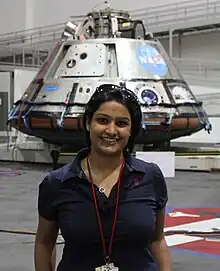Varsha Jain | |
|---|---|
| Nationality | British |
| Alma mater | University College London Imperial College London King's College, London |
| Occupation | academic researcher |
| Employer | University of Edinburgh |
| Known for | a "space gynaecologist" |

Varsha Jain is a British physician known as a "space gynaecologist". She has studied at universities in the UK but with an interest in space medicine. She is a clinical doctor also researching women's health at the University of Edinburgh.
Life
Jain says that she was first inspired to become a doctor after seeing the fictional Dr. Beverly Crusher in Star Trek whilst watching it with her brothers[1] in the Birmingham area.[2]
Her interest was inspired whilst attending the UK Space Biomedicine Conference in 2004.[3] In 2006, she graduated from University College London with a BSc focusing on medicine is extreme environments. She graduated from Imperial College London with her medical degree in 2008. During her medical school training, in 2007, whilst she was studying at Imperial College, she got the chance to study for seven weeks at the NASA Johnson Space Centre. She knew that she did not want to be a normal physician and this was an opportunity to work at NASA.[4] She worked with the neuroscience research team at NASA Johnson Space Centre research the balance recovery after first time astronauts went into space. Four years later, she completed a masters degree at King’s College London.[5] She studied space physiology and health, and conducted her dissertation project at NASA Johnson Space Centre. [3] She worked with Exploration Medical Capability team who look at in-flight diagnosis and treatments, to review the effiency of the medical systems onboard the International Space Station.[3]
In 2012, she was awarded an NIHR Academic Clinical Fellowship in the UK and focused her research purely on women's health in space. [6] In 2019, she awarded a Wellbeing of Women clinical research training fellowship and with this she moved to Scotland to works as a researcher at the University of Edinburgh.[7] Her research concerns endometrial phenotype in women with Abnormal Uterine Bleeding to understand why wiomen suffer from heavy periods.[5]
Jain's interest in the health of women in space is unusual for a doctor working in academia. She has been consulted on her knowledge of how women astronauts deal with toilets, menstruation and the risk to the eggs that they carry.[1] There are going to be more female astronauts, as NASA and the European Space Agency (ESA) increase their recruitment of female candidates. In 2020, she worked with a team of experts for ESA to create the first research agenda for reproductive health by any space agency.[8] It is noted that the average age for a female astronaut to have her first baby is between 38 - 41.[9] Jain was asked if she would go into space and she welcomed a short trip but feared the damage done to those who were in space for some time.[4] Jain has expressed the importance of conducting research on women's health in space as she feels it will benefit women's health on Earth.[6]In 2022 she was awarded an IRR Early Career Innovator prize[10]
References
- 1 2 "How space affects women and men differently". BBC News. 21 October 2019. Retrieved 6 March 2021.
- ↑ Koehler, Sezín (9 March 2016). "Boldly Going Where Few Have Gone Before: Meet Space Gynecologist Dr. Varsha Jain". HuffPost. Retrieved 6 March 2021.
- 1 2 3 "Varsha Jain - CASE". www.xtreme-everest.co.uk. Retrieved 6 March 2021.
- 1 2 "Space Gynaecology" (PDF). Brave New World: 21–23. Spring 2017. Archived from the original (PDF) on 22 April 2021. Retrieved 6 March 2021 – via rcog.org.uk.
- 1 2 "Birth Control, Blood Clots, and Babies in Space". International IVF Initiative. Retrieved 6 March 2021.
- 1 2 Cloakroom Confidential (26 November 2020). "Dr Varsha Jain: Cloakroom Confidential" (PDF). Cloakroom. Retrieved 4 October 2023.
- ↑ "Dr Varsha Jain's research into women's health in space". The University of Edinburgh. Retrieved 6 March 2021.
- ↑ "The SciSpacE White Papers". www.esa.int. Retrieved 4 October 2023.
- ↑ Wolfe, April (6 November 2015). "Ask a Space Gynecologist: NASA's Resident Expert Gets Real About Having Your Period in Zero Gravity". Marie Claire. Retrieved 6 March 2021.
- ↑ "Dr Varsha Jain wins the IRR Early Career Innovator Competition 2022". The University of Edinburgh. 12 May 2022. Retrieved 12 October 2023.